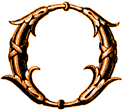
![]()
Laurence Oliphant (1829-1888) - British journalist, novelist,
explorer, diplomat, utopian, and spiritualist. A narrative of
his life history indicates the ideal career for a spy -- travel
to areas of diplomatic and military interest, followed by "a
pleasant book of travel," and he is rumored to have plotted
with Garibaldi in Italy. Prior to the Crimean War, he was a London
Times correspondent in Crimea. As private secretary to
Lord Elgin, he visited North America in 1855 and India, China,
and Japan in 1857-61. As first secretary of the British legation
to Edo (now Tokyo) in 1861, he was wounded during an attack on
the embassy in Edo by a group of xenophobic samurai, one of many
such incidents. In 1865, he was elected to Parliament, but in
1867, he and his mother abandoned their lives in England and joined
Thomas Lake Harris at his utopian community in New York state. There is some speculation that Harris had promised him a cure
for inherited syphilis, from which Oliphant suffered. He took
with him to Harris's Brotherhood six Japanese students from the
Satsuma domain, whom he had befriended in London. He later induced
a number of other Japanese to join the brotherhood. One biographer
(Taylor, 1982) suggests that his attachment to Harris was a result
of the dementia of inherited syphilis. His connection with the
utopian group lasted until 1881, when he broke with Harris and
formed, with his second wife, the daughter of Utopian Robert Owen,
his own community in Palestine. His first novel Picadilly
(1870) satirized the London social scene. He wrote a second novel
Altiora peto in 1883 and a spiritualist text Sympneumata
in 1885.
![]()
![]() Laurence Oliphant's long, strange life
Laurence Oliphant's long, strange life
![]()
![]() Oliphant, Swinburne and Henry Adams at dinner
Oliphant, Swinburne and Henry Adams at dinner
![]()
![]() William Gibson on Laurence Oliphant and more
William Gibson on Laurence Oliphant and more
 Opabinia regalis - Perhaps the most puzzling of all the Burgess shale animals, with five eyes and a spined nozzle for pushing food into its mouth.
Opabinia regalis - Perhaps the most puzzling of all the Burgess shale animals, with five eyes and a spined nozzle for pushing food into its mouth.
![]()
![]() Opabinia at the National Museum of Natural History
Opabinia at the National Museum of Natural History
![]()
![]() Opabinia in color
Opabinia in color
 Opium - Dried exudate of the immature fruits of the opium poppy,
first cultivated in Asia Minor, but now spread to suitable climates
(and some that are not) around the world. The presence of the
alkyloid thebaine in opium makes it and laudanum especially unsuitable
for use by infants and children.
Opium - Dried exudate of the immature fruits of the opium poppy,
first cultivated in Asia Minor, but now spread to suitable climates
(and some that are not) around the world. The presence of the
alkyloid thebaine in opium makes it and laudanum especially unsuitable
for use by infants and children.
![]()
![]() Adulteration and contamination of food in Victorian England
Adulteration and contamination of food in Victorian England
The Opium Wars - The Opium Wars between Britain
and China in 1840 and 1855, in which England waged war against China for the right to continue to sell opium to the Chinese people, served as an example to Japan of British power and an incentive to the Japanese to become strong enough in Western military ways to control their own destiny.
![]()
![]() A Short History of the Opium Wars
A Short History of the Opium Wars
Sir Richard Owen (1804-1892) - English biologist, a pioneer in
concise anatomical nomenclature, inveterate dissector and classifier of specimens. He suggested in 1841 that dinosaurs were metabolically advanced in the manner of mammals and birds.
![]()
![]() The lazy and impudent Richard Owen
The lazy and impudent Richard Owen
![]()
![]() Naming the dinosaurs
Naming the dinosaurs
![]()
![]() Dinosaurs and birds
Dinosaurs and birds
![]()
![]() Missing link?
Missing link?
![]()
The Difference Dictionary was first published
in slightly different form in Science Fiction Eye, Issue #8.
Text copyright 1990, 1996, 2000, 2003,
by Eileen K. Gunn.


